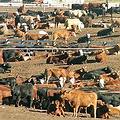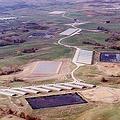 布希政府10月31日通過法案,允許美國超過15000座工廠式農場規避淨水法案的相關要求,只要業者聲稱沒有排放任何動物排泄物至湖泊、河川和溪流。
布希政府10月31日通過法案,允許美國超過15000座工廠式農場規避淨水法案的相關要求,只要業者聲稱沒有排放任何動物排泄物至湖泊、河川和溪流。
美國聯邦官員表示,此法規有助於保護水質,確保肥料的安全處理,但環保人士對此提出質疑,認為此項規定形同讓大型污染者成為自己的判官。
此法規對集中型動物飼養經營業者也有影響,這些業者所飼養的牛、豬和家禽,每年製造出5億噸的動物排泄物。
集中型動物飼養經營業者將排泄物貯存在大型的露天潟湖或隨意棄置在土地上。
這些含有肥料、氮、磷等成份的廢棄物一旦溢流,將會污染飲用水、導致魚類死亡以及引發疾病。
此項法規也影響到淨水法案下,關係到許可證發放的國家污染排放管制機制。
 針對排放或計劃排放排泄物至水路中的集中型動物飼養經營業者,必須申請國家污染排放管制機制的許可證,申請許可時也必須提出履行施肥管理的計畫。
針對排放或計劃排放排泄物至水路中的集中型動物飼養經營業者,必須申請國家污染排放管制機制的許可證,申請許可時也必須提出履行施肥管理的計畫。
而認為自己不需要任何許可證的業者則無需提出申請。
美國環保署預估此項新法規每年將可避免5600萬磅的磷、1億1000萬磅的氮和20億磅的沈澱物排入溪流、湖泊和其他水體之中。
環保署表示,此法規同時提供給那些自認不需要國家污染排放管制機制許可證的業者一個機會,也就是藉由取得零排放認證來實現他們預防污染的承諾。
但一但面臨業者決定不申請許可證,而又無法取得零排放認證時,環保署並未解釋是否將會因此採取任何制約行動。
前環保署執行官員、現任「環境正義計畫」負責人謝弗(Eric Schaeffer)指出,無論業者是否需要國家污染排放管制機制許可證,在定案的法規中聯邦或州政府皆不會重新檢視此項志願性決議。
The Bush administration finalized a rule Friday that allows more than 15,000 factory farms across the country to avoid certain requirements of the Clean Water Act if they claim they do not discharge animal wastes into lakes, rivers and streams.
Federal officials said the rule will help protect water quality and ensure safe disposal of manure, but environmentalists contend it does neither and lets some of the nation's largest polluters police themselves.
The rule affects concentrated animal feeding operations, CAFOs, which annually produce some 500 million tons of animal waste from cattle, pigs and poultry.
CAFOs store waste in massive open-air lagoons or dispose of it on land.
Spills and runoff of the waste, laden with the nutrients nitrogen and phosphorous, can contaminate drinking water supplies, kill fish and spread disease.
The regulation affects compliance with the Clean Water Act's National Pollutant Discharge Elimination System, NPDES, permitting requirements.
It calls on CAFOs that discharge or plan to discharge wastes into waterways to apply for an NPDES permit and to complete a nutrient management plan as part of their application.
Those who do not believe they need a permit will not need to apply for one.
The EPA estimates that the new rule will prevent 56 million pounds of phosphorus, 110 million pounds of nitrogen, and two billion pounds of sediment from entering streams, lakes, and other waters annually.
The agency said it is also providing an opportunity for CAFO operators who do not believe they need an NPDES permit "to show their commitment to pollution prevention by obtaining certification as zero dischargers."
EPA, for example, did not explain whether enforcement actions would be taken against operators who decided they don't need permits, but fail to achieve such certification.
The voluntary decision as to whether an NPDES permit is needed "would not be reviewable by federal or state authorities under the final rule," according to Eric Schaeffer, director of the Environmental Integrity Project and a former EPA enforcement official.
全文及圖片詳見:ENS





